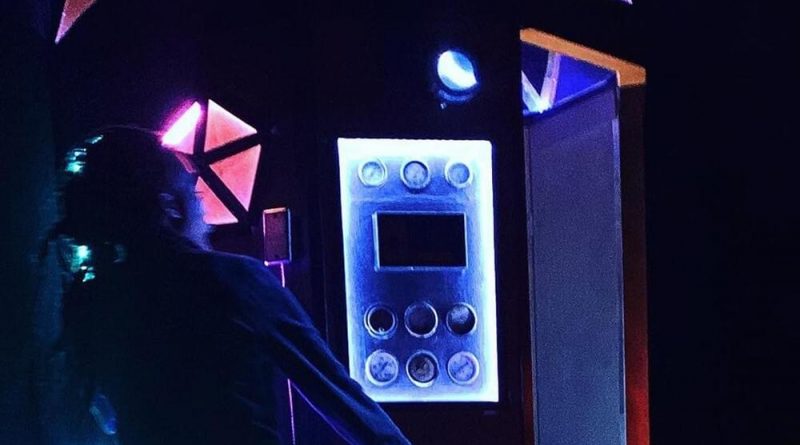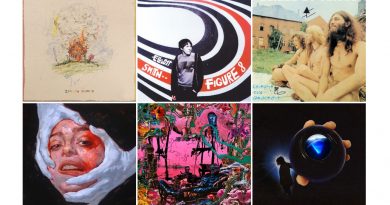ALBUM REVIEW: Circuit City by Moor Mother
Follow WHIP Twitter Facebook Instagram
WRITTEN BY: Benji Taylor
“The way they make home a dream, a wish, anything but a human right”
Circuit City stands as the latest effort from Philadelphia based artist Camae Ayewa, or better known as her alias Moor Mother. The album saw its official release on September 25th by way of Don Giovanni Records. Ayewa gained her first amount of critical success in 2016 with the release of her studio debut, Fetish Bones. The album featured spastic, authentic and masterful sampling akin to what some could describe as an industrial hip-hop aesthetic. What set the record apart from its contemporaries was Ayewa’s afro-centric and futuristic poetry that can be found interlaced throughout most of the tracks. By the end of the year, Fetish Bones would find itself on a myriad of music publication’s year-end lists.
From 2014 and on, she has made up one half of Black Quantum Futurism, an art collective based out of North Philadelphia. Along with Rasheedah Phillips, the collective primarily concerns itself with the concept of Afrofuturism, a sprawling ideology that examines the deliberate eradication of African culture and history and how this lived experience translates into a collective vision for the future. Using this concept as a framework, the collective bridges the gap between temporal mechanics, time dilation, cultural erasure, science fiction, oppression and the black diaspora through philosophy and the arts.
Over the years, Ayewa had proven herself to be as versatile as she is original. In each subsequent release since Fetish Bones, she has pushed the limits of artistry. Effortlessly blending styles from the punk scene, hip-hop, jazz, afro-beat and spoken word poetry. With each release she has paved the way for Circuit City. The album is an encompassing and chaotic free jazz epic that is broken into four acts: Act 1 – Working Machine, Act 2 – Circuit Break, Act 3 – Time of No Time and Act 4 – No More Wires. This is not a casual album. It offers no escapes from reality through dulcet soundscapes or smooth chord progressions. It is a suffocating, challenging and urgent experience. Ayewa demands the same from her listeners, as she does from society, our complete and utter attention.
As soon as “Act 1 – Working Machine” kicks off, the listener is greeted to an unfettered and increasingly erratic free jazz melody. Employing the stylings of saxophone virtuoso Keir Neuringer, Ayewa chooses to forgo the upfront and in your face synthesizers and heavy sampling she has been previously known for. This artistic choice to backdrop the albums messages and themes by the way of a convulsive and free flowing jazz instrumentation only emboldens what Moor Mother is seeking to confront on this latest effort. Throughout the album, Ayewa lays out her case for how the ghosts of America’s unjust origins oversee our current structures of power. During a deadly pandemic and horrifying financial collapse, thousands of empty homes in Philadelphia go unfilled. All the while, thousands of individuals facing housing insecurity, largely and disproportionately people of color, are still left unhoused.
As the song progresses, these themes are brought to the forefront. “The way they make home a dream, a wish, anything but a human right.” The saxophone and trumpets blare out heavily arpeggiated notes and a steady xylophone bangs on in the background. It gives the effect of a solid marching rhythm among a sea of confusion and turbulence. Interlaid throughout these verses are lines of descriptive poetry alluding to lost time, control and dehumanizing labor. She calls to consider the prospect of “Working for a machine, so big that you can’t see it” and begins to lay out for the listener her vision of Circuit City. The song reaches its culmination as Ayewa’s direct and uncompromising voice grows to bellow out “You ever been robbed of your Genius? To have your talent laid waste, with bones ripped from its neck?” A sentiment that no doubt brings to mind a quote from Stephen Gould, “I am, somehow, less interested in the weight and convolutions of Einstein’s brain than in the near certainty that people of equal talent have lived and died in cotton fields and sweatshops.” Or in this case, an Amazon fulfillment center.
The lyrics on the rest of Circuit City take on a more imaginative and ambiguous approach. All the while, staying true to the album’s themes and artistic conceptions. While the instrumentation is just as bombastic and abnormal as on the previous track, the artists heavy science-fiction influence shines through to a much larger degree from here on out. One of the more stunning moments on the project comes in the second act. The tempo picks up and the instrumentation begins to devolve into a wall of solid noise. Just as the mix reaches its breaking point, Ayewa calls over the track, “And maybe one day you’ll fight for the liberation of yourself.”
For all its weight and anxiety, Circuit City is not without its moments of awe inspiring beauty, on “Act 3 – Time of No Time,” Baltimore based neo-soul and anime inspired artist Elon Battle (stylized :3lON), lends his soulful voice to a welcomed reprieve from the calamity in acts one and two. Crooning over a sparse and atmospheric electronic instrumentation, Elon brings forward the Afrofuturistic notion of reimagining time and societies understanding of its progression ever forward.
Next is the closer, “Act 4 – No More Wires” and it is largely consumed by a repetitive meditation. Most of the lyrics on this song are echoed over and over again, “No more wires, no more wires.” There is a heavier influence from percussion on this track and at times a more coherent approach to melody. It gives the album a wonderful sense of completion as these divergent melodies begin to coalesce around the midway point. One of the last lines of actual dialog on the record comes as Ayewa does a bit of meta-commentary on free jazz. Truly a mark of the avant-garde, an artist comments on her art, through her art. On her latest record, Moor Mother uses all at her disposal to conjure up a new understanding of the world and a reimagining of the spaces we cohabitate. The forces of Afrofuturism, free-jazz, poetry, dance, science-fiction and temporal mechanics, all work to reinforce her vision. If there is one more reason to hope for the pandemic’s end, it is to go and see this performance live.




